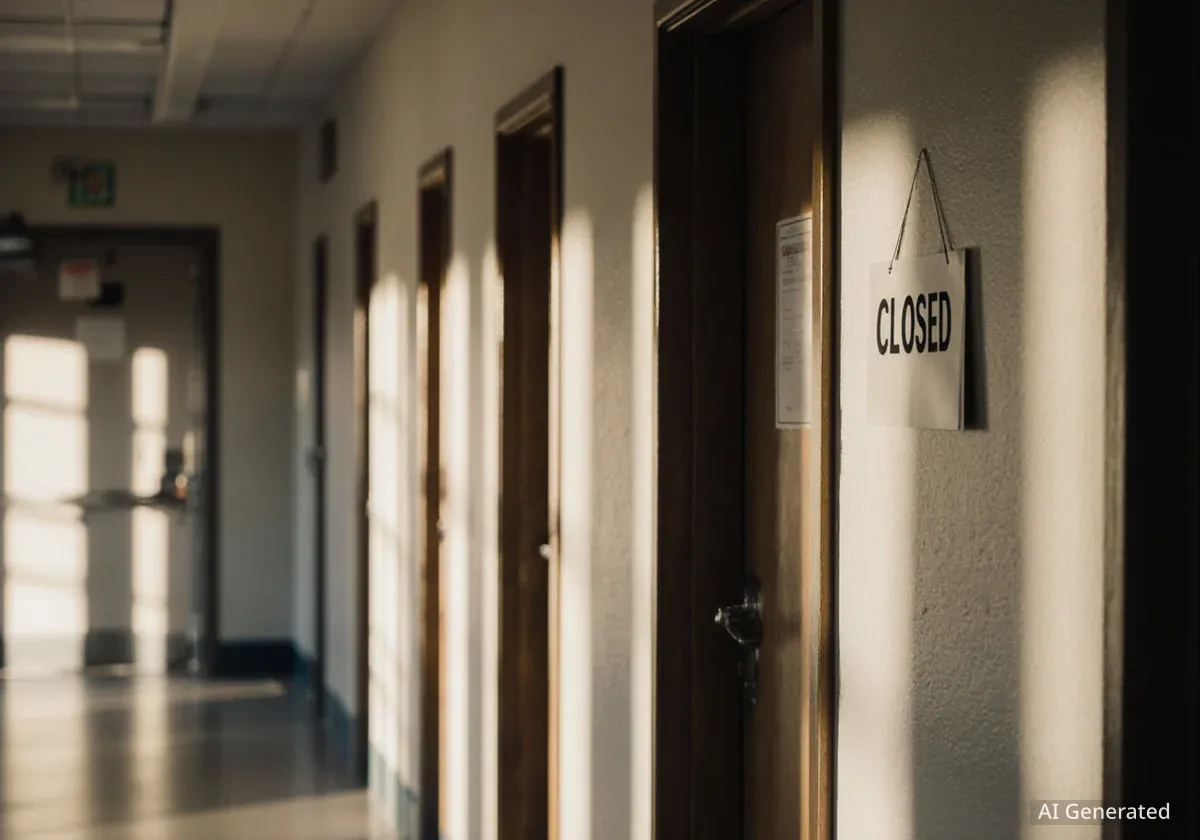Faculty members at the University of Nebraska-Lincoln are facing significant job uncertainty as the institution considers a proposal to cut its budget by $27.5 million. The plan, which includes the elimination of six academic departments, is currently under review, with a final decision expected from the Board of Regents in December.
The proposed reductions have prompted a series of hearings by the university's Academic Planning Committee, creating a climate of apprehension among professors whose positions and programs are at risk. The cuts could impact areas crucial for state workforce development, according to concerned faculty.
Key Takeaways
- The University of Nebraska-Lincoln is proposing budget reductions totaling $27.5 million.
- Six academic departments are slated for potential elimination under the current proposal.
- Faculty members have expressed serious concerns about job security and the impact on Nebraska's workforce.
- The University's Board of Regents is scheduled to vote on the budget proposal on December 5.
- If the cuts are approved, position eliminations would be finalized by December 2026.
Details of the University Budget Proposal
The University of Nebraska-Lincoln is confronting a significant financial challenge, leading administrators to propose a substantial $27.5 million reduction in spending. To achieve this, the university has identified several areas for cuts, with the most severe measure being the complete elimination of six departments.
Since the beginning of October, the university's Academic Planning Committee has been conducting hearings to evaluate the proposal. These sessions have provided a platform for discussion and review of the potential consequences of such deep cuts. The final hearing was scheduled for October 10, though it was not open to the public.
The fate of the proposal now rests with the University of Nebraska Board of Regents. The board is set to hold a critical vote on December 5 to either approve or reject the administration's budget reduction plan. According to the proposed timeline, if the cuts are authorized, any resulting faculty and staff terminations would take effect by December 2026.
The Role of the Academic Planning Committee
The Academic Planning Committee (APC) is a university body typically composed of faculty, students, and administrators. Its primary function is to review and provide recommendations on academic programs and policies, including proposals for program discontinuance. The hearings held by the APC are a formal part of the university's governance process before a final decision is made by the Board of Regents.
Faculty Members Voice Strong Opposition
Professors in the targeted departments are experiencing heightened stress and uncertainty. Many are now forced to defend the value of their programs while simultaneously supporting students and colleagues.
Sarah Zuckerman, an associate professor in the educational administration department, has found herself in a dual role. As president of the UNL chapter of the American Association of University Professors (AAUP), she is advocating for faculty across the campus.
"I am, on the one hand, working with the department to come up with data and contacting all of our students and alumni and on the other hand I am trying to support six departments," Zuckerman stated.
This increased workload comes on top of her regular teaching and research duties, highlighting the significant professional strain the proposed cuts have created for academic staff.
Impact on Nebraska's Workforce Development
A primary concern raised by faculty is the potential damage to the state's talent pipeline. Zuckerman argues that eliminating these departments will remove vital educational pathways for Nebraskans, particularly in fields with growing demand.
"I think this is really reducing opportunities for Nebraskans to pursue workforce development opportunities in areas that are going to be in high demand or already in high demand," she explained. This suggests the cuts could have long-term economic consequences for the state by limiting access to specialized training and education.
A Closer Look at One Department
The proposal to eliminate the educational administration department alone is projected to save the university nearly $2 million. However, faculty within the department question whether the financial savings justify the loss of the program and its contributions to the state's education system.
The Personal Cost of Job Insecurity
For many faculty members, the potential loss of their jobs is not just a professional setback but a personal crisis. The lack of job security is forcing some to contemplate leaving the state entirely.
Shavonna Holman, an associate professor in the same department as Zuckerman, is a Nebraska native who never imagined working elsewhere. The current situation has changed her perspective.
"This is my home and I have never once considered leaving the state of Nebraska because I have always found a sense of safety and happiness," Holman said. The uncertainty has eroded that sense of security, compelling her to consider opportunities outside the state she has always called home.
Holman expressed a clear and forceful opinion on the proposed cuts, questioning the logic behind the university's strategy.
"I see absolutely zero benefit of what they are trying to do," she remarked, reflecting a sentiment of frustration and disbelief shared by many of her colleagues.
This potential exodus of experienced educators represents a brain drain that could further affect the university's academic standing and the state's intellectual capital.
Next Steps in the Decision Process
With the Academic Planning Committee hearings concluded, the focus now shifts entirely to the Board of Regents. Their upcoming vote will determine the future of the six departments and the faculty who work within them.
The decision-making process includes the following key dates:
- December 5, 2025: The Board of Regents will vote on the proposed budget reductions.
- December 2026: If approved, this is the target date by which position terminations would be implemented.
The university community is now in a period of waiting as the final decision approaches. The outcome of the vote will have lasting implications for the University of Nebraska-Lincoln, its students, its faculty, and the broader state of Nebraska.





